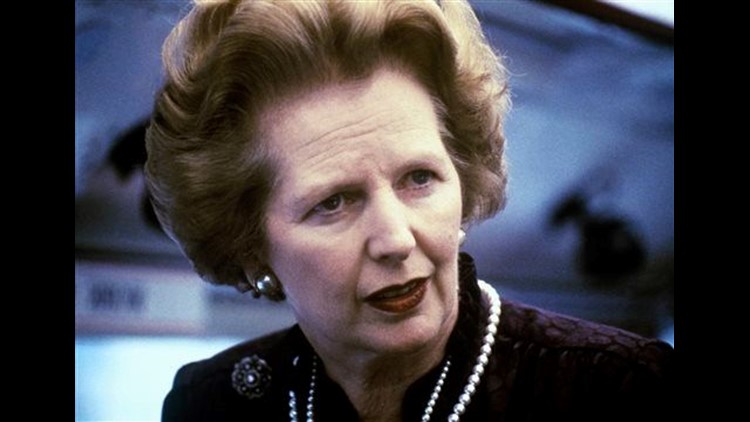Combative and determined to get her way, Margaret Thatcher divided opinion down the middle in life — and in death.
Many leaders lauded Thatcher for her steely determination to modernize Britain's industrial landscape, even at the cost of strikes and riots, and to stand beside the United States as the west triumphed in the Cold War versus the Soviet Union. Others saw a pitiless tyrant who preferred conflict to compromise.
British Prime Minister David Cameron lauded his 1980s predecessor as "a great Briton," but others — particularly Europe's socialists who often clashed with her — were less enamored in their reactions to the death Monday of the conservative icon.
Flags at Buckingham Palace, Parliament and across the United Kingdom were lowered to half-staff. Buckingham Palace said Queen Elizabeth II would send a private message of sympathy to the Thatcher family. Government officials began preparations for a London funeral with military honors at St. Paul's Cathedral next week, followed by a private cremation.
"As our first woman prime minister, Margaret Thatcher succeeded against all the odds," Cameron said in Madrid. He cut short his trip to Spain and canceled a visit to France to return to London for the funeral preparations.
"The real thing about Margaret Thatcher is that she didn't just lead our country. She saved our country," Cameron said, "and I believe she'll go down as the greatest British peacetime prime minister."
In Washington, President Barack Obama said many Americans "will never forget her standing shoulder to shoulder with President (Ronald) Reagan, reminding the world that we are not simply carried along by the currents of history. We can shape them with moral conviction, unyielding courage and iron will."
And former first lady Nancy Reagan said her husband and Thatcher "enjoyed a very special relationship" driven by a common hatred of Communism. "Ronnie and Margaret were political soul mates," she said in a statement that lauded Thatcher's "clear vision and strong determination to stand up for her beliefs at a time when so many were afraid to rock the boat."
In Poland, Foreign Minister Radoslaw Sikorski said his country should erect a statue of the British leader. In a tweet he praised Thatcher as "a fearless champion of liberty, stood up for captive nations, helped free world win the Cold War."
Former Prime Minister Tony Blair, who ousted the Conservative Party from power seven years after Thatcher's resignation, conceded that Thatcher had been right to challenge labor union power — the traditional bedrock for Blair's own Labour Party.
"Very few leaders get to change not only the political landscape of their country but of the world. Margaret was such a leader. Her global impact was vast," said Blair, who credited Thatcher with being "immensely supportive" despite their opposing views on many issues.
"You could not disrespect her character or her contribution to Britain's national life," Blair said.
Not all Britons agreed. Several hundred people gathered in Glasgow and in London's Brixton neighborhood for impromptu celebrations, complete with party hats and streamers.
The National Union of Miners — which tussled with Thatcher in a long 1984-85 strike, and lost — expressed condolences to Thatcher's family, but said: "The damage caused by her fatally flawed politics sadly lingers on. Good Riddance."
A cooler breeze also blew from across the English Channel, where many of the men who ran European governments in the 1980s expressed admiration for Thatcher's toughness mixed with femininity — but not her European Union-bashing politics.
European Commission President Jose Manuel Barroso of Portugal called Thatcher "a circumspect yet engaged player in the European Union."
Former French President Valerie Giscard d'Estaing called her "a woman unique in history" with "an unwavering strength."
D'Estaing recalled her impressive entrance to one meeting of EU premiers in France, where all the men were in black tie. "She went out of her car and she wore a long dress, a gown for a sort of ball, and everybody was sort of surprised and impressed. All the other members were flattered to speak with her," he recalled.
Harsh criticism came from Northern Ireland and Argentina, where Thatcher's reputation for unbending determination received early tests — when breaking an Irish Republican Army prison hunger strike in 1981 that left 10 inmates dead, then leading Britain into a 1982 war to reclaim the Falkland Islands from Argentine invaders.
Gerry Adams, leader of the Irish nationalist Sinn Fein party that gained strength from Thatcher's confrontation with IRA prison demands, denounced her as a hypocrite who sanctioned secret talks with senior IRA figures yet refused any concessions in public.
"Here in Ireland her espousal of old draconian, militaristic policies prolonged the war and caused great suffering. She embraced censorship, collusion and the killing of citizens by covert operations," said Adams, whose party ultimately gained a share of power in Northern Ireland after the IRA ceased fire and Blair invited Sinn Fein to the negotiating table.
Many other Irish politicians countered that Thatcher talked tough, but was more pragmatic in private — and dramatically demonstrated this by signing the Anglo-Irish Agreement of 1985 giving the Republic of Ireland a role in Northern Ireland for the first time. She struck the deal, infuriating the north's Protestant majority, barely a year after the IRA tried to assassinate her in a hotel bombing.
"She was presented as the Iron Lady, but she was open to change and she did change," said Noel Dorr, one of Ireland's senior diplomats in the 1980s who had close personal dealings with Thatcher.
Argentina's government offered no official reaction, but many Argentines blamed Thatcher for the deaths of 649 Argentine troops during the South Atlantic conflict. Some 255 British military personnel and three Falkland Islanders also died.
"Thatcher — it's more or less a bad word here in Argentina," said Buenos Aires resident Ruben Chaves. "Nobody here has good feelings towards that name."
Falklands lawmaker Mike Summers said Thatcher was "one of very few political leaders who could have mounted the expedition she mounted in 1982 to restore our freedom, and from a Falkland Islands perspective she will be forever remembered for that."
Pop culture figures past and present sounded off, too.
Arnold Schwarzenegger, the actor and former Republican governor of California, offered a Twitter tribute to Thatcher as "a visionary, a warrior and a once-in-a-lifetime leader who left the world better than she found it."
Others noted her inspirational role to women, even though Thatcher famously eschewed feminism and rarely promoted women herself.
"Thinking of our 1st Lady of girl power, Margaret Thatcher, a green grocer's daughter who taught me anything is possible," tweeted a former member of the Spice Girls band, Geri Halliwell.
Copyright 2013 The Associated Press.



